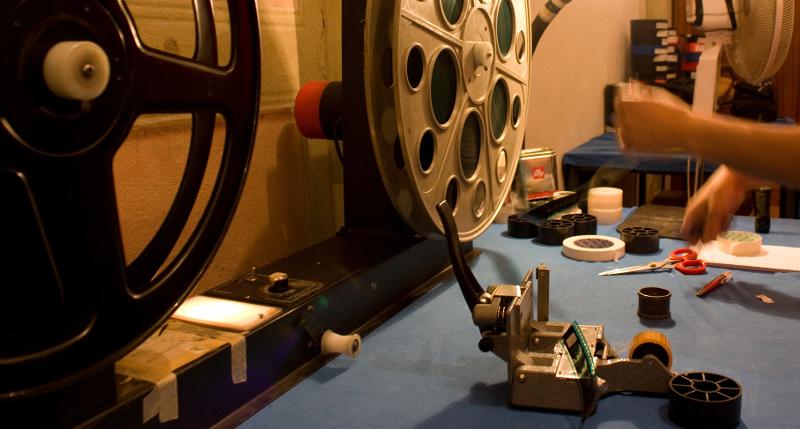Cinema as a Meeting Place: Interview with Giovanni Vanore from Ucca
The interview from the radio program "Le strade per l'Europa" with Giovanni Vanore, project coordinator of Ucca, the Italian Union of ARCI Circles dedicated to cinema.

As Europe faces increasing pressure from restrictive migration policies and the rise of right-wing movements, Ways of Europe takes on the ambitious challenge of redefining the physical and symbolic borders of our continent, transforming them into opportunities for dialogue and collaboration. Through a transnational network of events, ambassadors, and cultural initiatives, this project represents the natural continuation of Words of Europe and aims to build a more inclusive and participatory Europe. The hosts of Le strade per l'Europa, the new segment of the radio program La Giusta Frequenza, discuss this topic with Giovanni Vanore, project coordinator of Ucca.
Giovanni, let's start with you and Ucca: what is it, and why is it part of this network?
Ucca is the Union of Arci Cinematographic Circles, a territorial network that promotes cinema as a tool for socialization, inclusion, and as a cultural and artistic practice that operates on territories through film screenings, festivals, workshops, and much more. This is precisely why we joined this second edition of the project that began a couple of years ago, Ways of Europe. Through cinema and cultural practices, we will bring across Europe the themes we deeply care about: combating social inequalities and promoting cultural practices as a tool for social cohesion; we will talk about solidarity, human rights, and migration.
Solidarity, human rights, and opposition to inhumane immigration policies are some of the themes addressed in the WE project. You will specifically tackle them through film screenings. Which films will you be presenting? Our listeners might be interested in watching them as a step toward a fairer Europe that looks to the future.
We will organize screenings in various cities, including Lampedusa, Barcelona, and Budapest, as part of the transnational meetings. Additionally, we will hold multiple screenings in Italy through the Ucca network, and we invite listeners to follow us on our social media channels to participate in the screenings organized in their cities. The film selection is still being finalized, but we will certainly address migration with a deeply critical perspective on current migration policies promoted by both individual states and the European Union. We will do so with films that adopt a decolonial perspective, prioritizing the viewpoints of the protagonists, centering the themes of solidarity and the violation of human rights occurring at the European Union's borders as well as within the cities we live in.
We will select films set not only in Italy but also in other European contexts, shedding light on the racism embedded in policies implemented at local and national levels. We will discuss social inequalities also through the environmental sustainability and the stories of those who strive to protect their territories from real estate speculation, gentrification, and touristification, which are increasingly prevalent across all European cities. Gender issues will also be a key focus, not only because they are fundamental, but also because we have observed in recent years a growing participation of young people in film screenings on these topics. These are identity-related themes that foster intragenerational dialogue, allowing us to engage not only project-affiliated organizations but also local associations. Through this project, we aim to sustain and amplify ongoing local initiatives by activating a network that we are already part of in various territories.
Among Ucca's initiatives for WE, there is also an instant movie. What is it, and what will it focus on?
The instant movie format has become increasingly common in recent years, even on major online cinema platforms, where documentaries, shorts, or even films about very recent current events are frequently released. It can be described as a documentary that narrates a news event by involving all the stakeholders—a sort of live documentary, halfway between reportage and documentary filmmaking.
We will produce ours between Dunkirk and Calais, two cities that represent one of Europe's borders. Unfortunately, the plight of migrants in Calais, despite persisting for years, is rarely reported, especially in Italy. However, it deserves attention as it reveals how states keep the realities of migration, particularly of those seeking protection, away from public scrutiny. During our time there, we will document not only the socio-cultural context of these locations but also the individuals involved in various initiatives. We will conduct interviews with those actively engaged in these efforts and report on the situation between Calais and Dunkirk, naturally involving the associations that work daily on the issues we care about.
Last year, the project was called Words of Europe—words that now take shape as ways, becoming tangible. To conclude: what is your word and what way do you envision for the Europe of the future?
My word is possibility—a term that may seem broad, but we often fail to recognize that through the construction of collective paths and the strengthening of spaces for participation, we have a great opportunity. Not just as individuals, in terms of social and cultural growth, but collectively—the opportunity to take action, even in small steps, toward change.
This is crucial in today's world, where individualism is exacerbated, and spaces for socialization and community are lacking. Through cinema and cultural practices, we strive to counteract this, including through WE. It is the possibility of belonging to something, of not feeling alone in the face of the distressing realities we witness daily—from conflicts to violence. Being together allows us to see reality differently and perhaps even change it.


